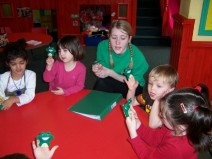LIST OF ARTICLES
|
Introducing Foreign Language Learning Activities to under 5s
1. You don’t need to be a fluent speaker or a ‘specialist’ teacher to introduce a foreign language into the early years’ setting. You can achieve a lot with just a basic knowledge of the language and lots of enthusiasm and ideas.
2. Don’t let the fear of making mistakes in the language put you off – even the most experienced teachers and native speakers make them!
3. Before you start, decide exactly what you want to teach the children, but keep it simple. Start off with just a few words and phrases that you want to introduce e.g. greetings or saying their names. Build up on these gradually as the children become familiar with them and your confidence grows.
4. Don’t introduce too many new items of language at one time. Remember also to keep going back over words and phrases that you have already introduced and re-visiting previous activities
5. Children will learn more quickly and effectively with short, regular exposure to the language, rather than longer, infrequent sessions.
A little and often is the best way!
6. Find lots of different opportunities for the children to hear and use the language. Everyday routines and activities such as taking the register, meal and snack times, circle time all provide language-learning opportunities. Involve other staff in this, as much as possible. An adult speaking another language, even to a limited extent, provides a good role model for the children.
7. Include language-learning activities in your daily planning. 10 – 15 minutes spread over each day is ideal. Keep the activities short, varied and fun.
8. Build up a bank of 5 or 10 minute activity ideas so that you can draw on them at any time.
9. Introduce simple songs and rhymes in the foreign language. Their rhythm helps children remember the words in an enjoyable and effective way.
10. Use or adapt your current resources to practise the foreign language e.g. there are lots of educational games in most early years’ settings which teach numbers, colours, names of animals etc.
11. Involve parents and carers in what you are doing. Let them know that their child is learning another language. Invite them in to watch and encourage them to take part. Send home information on what the children have learned and how parents can support this, e.g. through tapes of songs learned, examples of simple games and ideas for watching TV programmes together. Children whose parents are positive about language learning will make good progress in it themselves.
Most importantly, enjoy learning the language and have fun!
Pam McKenzie M.A.
|

Having furn with Spanish
|
|
|